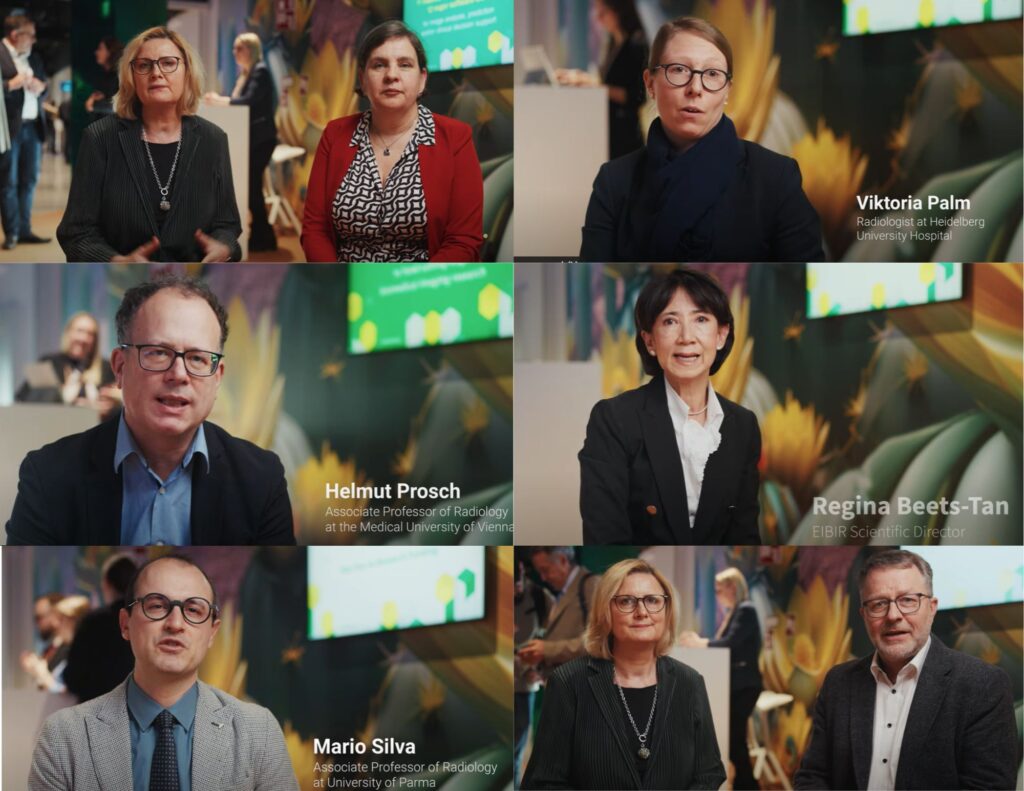
SOLACE at ECR 2025: Advancing lung cancer screening through collaboration and innovation
At the 2025 European Congress of Radiology (ECR), members of the SOLACE project team featured in a series of interviews highlighting its contribution to lung cancer screening across Europe, including:
- Joanna Chorostowska-Wynimko (SOLACE Scientific Coordinator, and National Institute of Tuberculosis and Lung Diseases, Warsaw)
- Anna Kerpel-Fronius (SOLACE Scientific Coordinator, and National Korányi Institute for Pulmonology, Budapest)
- Viktoria Palm (Heidelberg University Hospital)
- Helmut Prosch (Medical University of Vienna)
- Mario Silva (University of Parma)
- Regina Beets-Tan (European Institute for Biomedical Imaging Research)
- Hans-Ulrich Kauczor (University Hospital Heidelberg)
Joanna Chorostowska-Wynimko and Anna Kerpel-Fronius: Introducing SOLACE
In this interview, Joanna Chorostowska-Wynimko and Anna Kerpel-Fronius introduced the aims of the SOLACE project. They explain how SOLACE supports lung cancer screening across Europe through clinical collaboration, digital innovation, and system-wide coordination.
htps://www.youtube.com/watch?v=IyVM9h_4SpU
Viktoria Palm: Supporting radiologists in daily practice
Viktoria Palm, a radiologist involved in the SOLACE project, spoke at ECR 2025 about the high workload radiologists face, including long hours and the increasing complexity of image analysis. She explained how this pressure affects both staff wellbeing and patient care.
She described how SOLACE is helping by testing artificial intelligence (AI) tools designed to ease the burden. These tools aim to speed up routine tasks, highlight urgent cases and support clinical decision-making. Palm stressed that the aim is not to replace radiologists, but to make their work more manageable and efficient.
https://www.youtube.com/watch?v=9GyWwnzHk_Q&t=17s
Helmut Prosch: Coordinating screening across Europe
Helmut Prosch, who is part of the project coordination team, gave an overview of SOLACE’s wider goals. In his ECR 2025 interview, he outlined how the project is supporting the implementation of national lung cancer screening programmes across EU countries.
Prosch highlighted the development of shared policies, training programmes, and quality standards to support consistent, effective screening. He also spoke about the importance of involving a wide range of professionals — from radiologists to general practitioners — to ensure the success of these programmes.
In this additional interview, Prosch expands on the role of coordination in ensuring effective screening implementation. He discusses how SOLACE is working to align efforts across countries and build structures that support long-term sustainability.
https://www.youtube.com/watch?v=pNxMq7vYeIk
Regina Beets-Tan: Strengthening collaboration at the EU level
Speaking at ECR 2025, EIBIR’s scientific director Regina Beets-Tan placed SOLACE within the broader context of EU health research. She explained that the project is part of a wider effort to support collaboration across disciplines and countries in medical imaging.
Beets-Tan highlighted SOLACE as one of several major projects helping to build a more connected and strategic approach to cancer screening and imaging research across Europe.
https://www.youtube.com/watch?v=Yyesv75I-K8
Mario Silva: Insights from the ESTI position paper
Mario Silva discusses the European Society of Thoracic Imaging (ESTI) position paper and its relevance to SOLACE. He reflects on how the guidance supports the project’s goals, emphasising the importance of standardised imaging protocols, quality assurance, and collaborative frameworks in driving forward lung cancer screening across Europe.
https://www.youtube.com/watch?v=m5wUn-KBEq0
Joanna Chorostowska-Wynimko and Hans-Ulrich Kauczor: Key achievements of SOLACE
In this interview from ECR 2025, Joanna Chorostowska-Wynimko and Hans-Ulrich Kauczor highlight the key achievements of the SOLACE project to date. They discuss early progress in pilot sites, improved coordination across clinical teams, and advances in AI-supported workflows, with a focus on practical impact and next steps for implementation.
https://www.youtube.com/watch?v=ndtFVaLYyTE
Funded by the EU4Health programme and part of Europe’s Beating Cancer Plan, SOLACE is helping countries roll out screening programmes using a coordinated and evidence-based approach.

